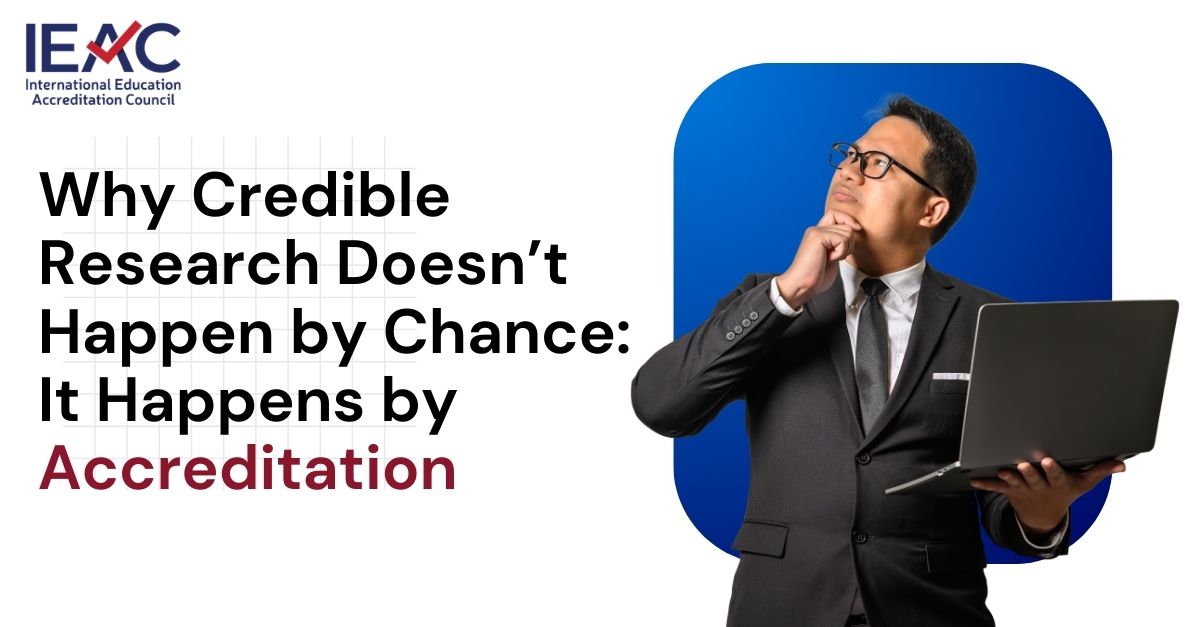- Home
- About IEAC
- Accreditation
- University Accreditation
- College Accreditation
- Online Institution Accreditation
- School Accreditation
- University Recruitment Agency Accreditation
- Programmatic Accreditation
- Teacher/ Lecturer Accreditation
- Religious Institutes Accreditation
- Affiliate Accreditation
- Research Accreditation Candidacy Accreditation
- IEAC Membership
- Institutions Accredited
- Accreditation Process
- Contact Us Webinar Apply Now
Blog
Accredited vs. Non-Accredited Schools: What Every Parent Should Know
Lorem ipsum dolor sit amet, consectetur adipiscing elit, sed do eiusmod tempor incididunt ut labore et dolore magna aliqua. Quis ipsum suspendisse ultrices gravida. Risus commodo viverra maecenas accumsan lacus vel facilisis.
.jpg)
Accredited vs. Non-Accredited Schools: What Every Parent Should Know
When it comes to your child’s education, not all schools are created equal. While many institutions promise quality and excellence, accreditation is what separates genuine academic credibility from mere claims.
School Accreditation serves as a quality assurance process, verifying that an institution meets defined standards of education, management, and student welfare. For families exploring School Accreditation in Thailand or elsewhere, understanding this concept helps make more informed choices, ensuring that your child’s learning experience aligns with globally recognized standards.
In this blog, we’ll explore the key differences between accredited and non-accredited schools, what accreditation actually means, and why it’s crucial for your child’s academic growth and future opportunities.
What Does Accreditation Mean?
Accreditation is an official recognition granted to schools or educational institutions that meet established quality benchmarks set by accrediting bodies. These benchmarks often cover:
- Curriculum relevance and structure
- Faculty qualifications and development
- Student support and welfare systems
- Administrative transparency
- Academic outcomes and continuous improvement
Simply put, accreditation acts as a stamp of trust, showing that a school has been independently evaluated and meets international or national standards of excellence.
5 Key Differences Between Accredited & Non-Accredited Schools
Understanding how accredited and non-accredited schools differ helps parents make informed choices. Here are five key areas where accreditation truly makes a lasting impact on a child’s educational experience.
1. Quality Assurance and Oversight
Accredited schools are regularly evaluated by recognized educational authorities to ensure they maintain high academic and operational standards. These evaluations often include classroom observations, teacher assessments, and curriculum reviews. This consistent oversight guarantees that students receive well-structured, effective education.
On the other hand, non-accredited schools, operate without such checks. While they may have passionate educators, the lack of official evaluation means there’s no external confirmation of their quality or compliance with educational benchmarks.
2. Curriculum and Teaching Standards
In accredited institutions, the curriculum aligns with national or international educational frameworks. Lessons are designed to promote critical thinking, creativity, and holistic development. Teachers are encouraged to follow structured learning outcomes that ensure balanced academic growth.
Non-accredited schools might design their own curriculum, which can sometimes lead to innovative teaching but often results in inconsistency. Without clear standards, students may miss key learning objectives, making transitions to other schools or higher education challenging.
3. Recognition of Certificates and Qualifications
One of the most significant differences lies in recognition. Accredited schools issue certificates and diplomas accepted by universities, employers, and global education systems. This recognition ensures that your child’s qualifications hold value wherever they go.
In contrast, certificates from non-accredited schools may not be recognized beyond local contexts. This can limit opportunities for higher education, international transfers, or even job placements in the future. Essentially, accreditation safeguards the credibility of your child’s hard work.
4. Accountability and Continuous Improvement
Accreditation isn’t permanent, it requires schools to demonstrate ongoing improvement. Accredited institutions are re-evaluated periodically, ensuring they adapt to new educational trends, update teaching methods, and maintain transparent management practices.
Non-accredited schools lack this accountability. Without the pressure to meet evolving standards, some may stagnate, relying on outdated materials or unstructured teaching approaches. Accreditation, therefore, serves as a built-in mechanism for quality evolution.
5. Student Support and Holistic Development
Beyond academics, accredited schools emphasize well-rounded student development. They typically offer structured counseling, co-curricular programs, inclusion initiatives, and parent engagement policies. These support systems ensure that students thrive academically, socially, and emotionally.
In comparison, non-accredited schools might focus mainly on academics, with limited resources for emotional well-being, career guidance, or special education support. Accreditation ensures that the institution views students not just as learners, but as whole individuals.
Why Accreditation Matters for Parents?
For parents, choosing an accredited school means peace of mind, knowing your child is receiving a well-rounded education that meets global quality standards. It ensures:
- Qualified, trained teachers
- A safe and supportive learning environment
- Recognized certifications and future study options
- Consistent monitoring of academic quality
Accreditation protects your investment in your child’s education and guarantees that the institution values transparency and continuous improvement.
School Accreditation in Thailand: A Growing Priority
In Thailand, school accreditation has become an increasingly important measure of trust and quality in education. With the country’s growing number of international and private schools, accreditation ensures parents that institutions are aligned with international benchmarks in teaching, curriculum, and governance.
Many Thai schools now seek recognition from regional and international accrediting agencies to demonstrate their commitment to educational excellence. For parents, checking a school’s accreditation status before enrollment is an essential step toward making an informed decision.
Final Thoughts
Choosing between accredited and non-accredited schools isn’t just about prestige — it’s about ensuring your child’s education meets recognized standards of quality, safety, and growth. Accreditation offers assurance that a school’s practices, teachers, and learning outcomes are regularly reviewed and validated.
Whether you’re evaluating local options or exploring School Accreditation in Thailand, understanding accreditation helps you make confident, future-focused decisions for your child’s academic journey. In the end, accreditation isn’t just a certificate, it’s a promise of quality education that lasts a lifetime.
Frequently Asked Questions (FAQs)
1. What does it mean when a school is accredited?
Accreditation means that a school has been evaluated and approved by an external educational authority. It confirms that the school meets established standards for curriculum quality, faculty qualifications, student welfare, and overall management.
2. Why is accreditation important when choosing a school for my child?
Accreditation ensures that the school follows reliable teaching methods, maintains qualified educators, and provides recognized certifications. It offers parents peace of mind that their child’s education meets national or international benchmarks.
3. How can parents check if a school is accredited?
You can verify a school’s accreditation by visiting its official website or checking the accrediting body’s directory. Many schools proudly display their accreditation status on promotional materials and certificates for transparency.
4. What risks come with enrolling in a non-accredited school?
Non-accredited schools might lack oversight, leading to inconsistent teaching quality, unrecognized qualifications, and limited higher education or career opportunities for students. It’s always best to confirm accreditation before admission.
5. Is school accreditation common in Thailand?
Yes. School accreditation in Thailand is becoming increasingly recognized as a mark of trust and educational excellence. Many international and private schools now seek accreditation to ensure global recognition and maintain high teaching standards.






